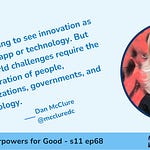Chapter 60: Patience and Optimism - Bill Gates
Devin: A few years ago, you wrote about superpowers in your annual letter. What is your superpower?
Bill: Well, if I have one, it has something to do with optimism about scientific innovation and being able to gather teams of people. My experience at Microsoft was assembling teams of engineers and understanding what was on track/off track, being patient for things that, in that case, usually took five or six years. In the world of medicine, unfortunately, it's like ten years. The HIV vaccine—between when people started working on it and when we'll finally have one—that will have been almost 25 years. So the patience required, the need to have multiple strategies, so it's there in pushing for innovations.
And then directing the resources that I'm lucky enough to have both through Microsoft and that Warren Buffett has made available. Thank goodness it's allowed us to be ambitious, including the scale we're at on polio. Warren was just in Seattle this week, and I was saying to him, “Hey, Pakistan—a few setbacks.” And he said, “You gotta keep going. You know, it's great that you're doing this.”
Bill Gates, the founder of Microsoft and co-chair of the Bill and Melinda Gates Foundation, was, for nearly a generation, the wealthiest person on the planet. Among billionaires, he has been the role model for genuine philanthropy. Using the Giving Pledge, he has advocated for donating the majority of one’s wealth to solve society’s most pressing problems.
He personally executes this pledge through his foundation. The Gates Foundation is the largest private foundation in the world. For years, its most significant funding commitment has been to the eradication of polio. While the end of polio will not be celebrated in 2021, there are early signs that the last case of wild poliovirus could be this year. As of this writing, there have been just two cases in the entire world, one each in Afghanistan and Pakistan.
The bigger problem now is the number of circulating vaccine-derived poliovirus (cVDPV) cases. One in several million immunizations using the Albert Sabin oral polio vaccine mutates, and a child catches or becomes contagious with the disease. In communities with low vaccination rates, polio spreads. In 2021, there have been dozens of cVDPV cases.
This problem highlights the contribution of the Gates Foundation. Under Bill’s active leadership, the Gates Foundation began work a decade ago on a new oral vaccine that cannot mutate to cause even a single case of polio.
At the time, India, which many had expected to be the last country with polio cases, appeared to have eradicated the disease. A few years later, that result was confirmed. So, as the Gates Foundation was talking about developing a new polio vaccine that might not be ready for use for a decade, many thought it would never be needed because the disease would be eradicated before a new vaccine could be approved.
Fast forward, and the incredible foresight is clear. The Gates Foundation and its partners in the Global Polio Eradication Initiative (Rotary International, the World Health Organization, UNICEF, the U.S. Centers for Disease Control and the Global Vaccine Alliance) are now deploying the novel vaccine to replace the traditional Sabin oral vaccine.
The novel vaccine could be the only way to stop the spread of polio as immunization rates fall in countries that haven’t had a case of polio in years or even decades. In such places, one mutated vaccination can start an outbreak. The novel vaccine shepherded by Bill himself will be the linchpin to polio eradication.
The novel vaccine is also a great example of Bill using his superpowers: optimism and patience. His particular brand of optimism focused on his ability to move the vaccine process forward quickly enough to play a role in eradication while at the same time having the patience to work on it for a decade.
Following Bill’s example, you can make optimism and patience your superpowers, too.
How to Develop Optimism and Patience as Superpowers
Bill’s optimism and patience have helped make the world a better place, especially for the millions of children who would have contracted polio had he not worked to prevent it. You can develop the same superpowers.
In Chapter 56 with Slava Rubin, you read about how to develop optimism as a superpower. Here, you will read how to use your optimism to strengthen your patience and how patience can amplify and expand all your superpowers.
Operating with the view that your efforts will bring desired results makes patience easier to manifest. Good things always seem to take longer than expected, but remaining hopeful helps you keep working for the outcomes you want. Bill worked for a decade on the new vaccine, hoping it would arrive in time to be of help in the fight to eradicate polio. Thank heaven he did.
Psychologist Paul Jenkins has some ideas for developing patience that I’ve adapted for this chapter.[1]
1. Think about your thinking. Developing patience requires you to think about the fact that you have some control over your thinking. You can observe your thoughts and feelings, the inner dialog in your head. (Psychologists call this metacognition.) Not only can you monitor what’s happening in your mind, but you can also change it.
2. See your expectations. Now that you are in your head, you can see how things that cause you to feel disappointed, frustrated or impatient often happen because what is happening doesn’t align with your expectations around timing. Some people who will camp overnight, waiting for the first chance to buy a new consumer product, get frustrated waiting a few minutes for fast food. It is not the wait that causes the problem; it is the expectation that fast food should come faster. Look at how your expectations about your progress may be contributing to your impatience.
3. Assess the now. Recognizing that you may not be where you’d hoped, and that may have important implications, ask yourself if it is too late? Bill hoped the vaccine would be available sooner but could see its future value. Progress may have been slower than expected, but it was not too late. The novel vaccine may hold the key to polio eradication.
4. Inventory your progress. Take a moment in your pain to reflect on the progress you’ve made, the skills you’ve learned and the people you have helped. If you have been working to address a significant social problem, you’ll have something to show for it, even if it is primarily a better understanding of the challenge.
5. Accept what is. Understanding that you aren’t where you hoped to be, you can choose to accept that reality. The choice to accept the situation can be a conscious one that helps relieve the pain you’re feeling.
6. Change your expectations. You don’t need to give up on your goals, but there may be times during your journey to impact when you have to recognize that you aren’t where you expected to be. Recalibrate. Change your expectations. This adjustment will contribute to a sense of relief and allow you to move forward.
7. Keep working. One final step to help you overcome feelings of impatience is to keep working. Taking action is empowering. Once you’ve completed the steps above, do something to move you toward your ultimate goal.
With patience, you have a superpower that strengthens every other superpower in the book. Learning to move forward patiently will improve your tenacity and persistence. It will reflect on your optimism, allowing you to be hopeful even when others despair. By giving yourself time to develop any of the superpowers in this book, you enable yourself to conquer more of them.
Remember, some of the superpowers in the book may be yours to master. Others may illuminate a weakness that limits your success. With effort and time, you can eliminate such shortcomings. No one has all 60 superpowers described in this book. Not even Bill. Following his example, pairing optimism and patience, can enable you to do more in the long run than you ever imagined.
This is an excerpt from my book, Superpowers for Good.
[1] November 14, 2019, Dr. Paul Jenkins, Vicki Jenkins, “How To Be Patient In A Relationship,”






















How Bill Gates Combines Optimism and Patience to Change the World